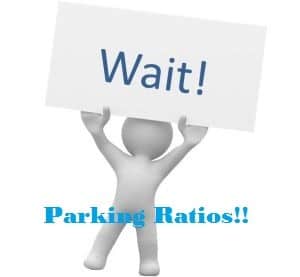Parking Ratios
Parking Ratios for Office Space
Over the years, we have had folks contact us about leasing office space and there is one attribute that seems to fall thru the cracks more so than other parts of leasing an office in Austin. It comes down to parking and parking ratios. A lot of tenants may think, no big deal, I can lease an office in Austin and parking is not a problem. Is this true? Actually, it is not true and should be of great concern. You see there are municipal codes in place called parking ratios that allow for only a specific number of parking spaces based on the type of use a tenant has and the square footage occupied. Are there some parking lots for buildings that are overbuilt to handle more parking the answer is yes, however when it comes to a 100% occupied property the parking ratios will be more stringent.
Parking Ratios based on Office type?
So how does it layout and what should a tenant expect? Well the first question that has to be answered is : What type of use is the office going to used for? Why? Because certain uses have higher parking ratios than others. Here are some quick examples a Billiard Hall will have 1 space for every 100 square feet, a Medical office will have 1 space allocated for every 275 SF. What about a general office space? A professional office is 1 space for every 275 SF , recently a potential client called us asking for 1000SF and enough parking for 20 people, well let’s do the math. If they are using this as a professional office on 1000SF they are only going to be allotted 4 parking spaces. So how are they going to find a space that has a parking ratio for 20 people? You see a professional broker would have flagged this and said they do not have realistic expectations and it won’t work. Let’s take a scenario, you lease a 1000SF office and there seems to be plenty of parking because after all the property only has 80% occupancy. All of a sudden a few big leases go down and now the property is 95% occupied and the fellow tenants are complaining that you are taking up their parking spaces, is that a problem? Yes, it is going to be. So make sure your broker covers your bases with you before you are given an impression that it is no big deal.



 Leasing Retail Space
Leasing Retail Space 